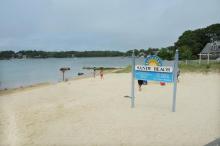Pilot tree inventory program set to begin data collection this summer
There are all sorts of trees in Dartmouth and it's the responsibility of the tree warden to manage them. However, with the vast number of public trees in town, it can be hard to keep track of them all.
The Dartmouth Tree Committee and its friends may have a solution, but will need the community’s help.
Adam Korejwa, who was appointed to the committee at the Monday, April 29 Select Board meeting, said he will be leading the initiative to create an inventory, or database, of Dartmouth’s public trees, which would include street trees and ones located on public property.
This, of course, is a challenging endeavor, but he argues it’ll be worth it.
Looking at places such as Portland and New York City as models, Korejwa is running a pilot of the program this summer, which he’ll need lots of volunteers for, he said.
At the committee’s Wednesday, May 1 meeting, Korejwa explained some of the value of such a database, which would include information on the tree’s location, type, girth, age, height and possibly more.
Having this information, “we can get a better understanding of where we may want to plant trees and which areas we may want to spend a little more time caring for trees.”
The database would be able to help identify threats to the trees, such as pathogens or insects, making tree management and long term planning easier.
The town would also be able to identify trees that are considered “dangerous” so they can be removed as well as dead trees that need to be replaced.
“I’ve noticed a couple trees and I don’t even know how to report them,” Korejwa said, adding how there is one tree with a fungus eating through the heart of it and now “I can almost fit into the tree.”
However, he argues that with a database available through a smartphone application, anyone could submit a report, enhancing not only the maintenance of trees, but also public safety.
Every tree has a monetary value based on a variety of factors, such as flood and pollution protection, which is information that could also be considered while developing the inventory.
Korejwa said he initially got involved with the project when he “let it slip” he has knowledge of Geographic Information Systems, which are computer-based tools used to interpret geographic data.
With the data collected, interactive maps can be created and used not only to help the town, but could be left open to the public and used for educational purposes.
Korejwa said an example would be if a class held a scavenger hunt looking for specific trees, or if they were tasked with finding animals based on their knowledge of trees and the information available in the map.
The pilot will be taking place this summer, but a full inventory will not be completed at its conclusion. Korejwa said it could take a couple years, but the pilot will allow the committee to sort out any problems they run into and become familiar with the technology.
This summer’s pilot will include the help of Steve Lohrenz and his students from UMass Dartmouth, but additional volunteers will be needed to help identify trees and take measurements.
“Anybody who would be interested in coming out here to help with this project — that’d be wonderful,” Korejwa said.
















